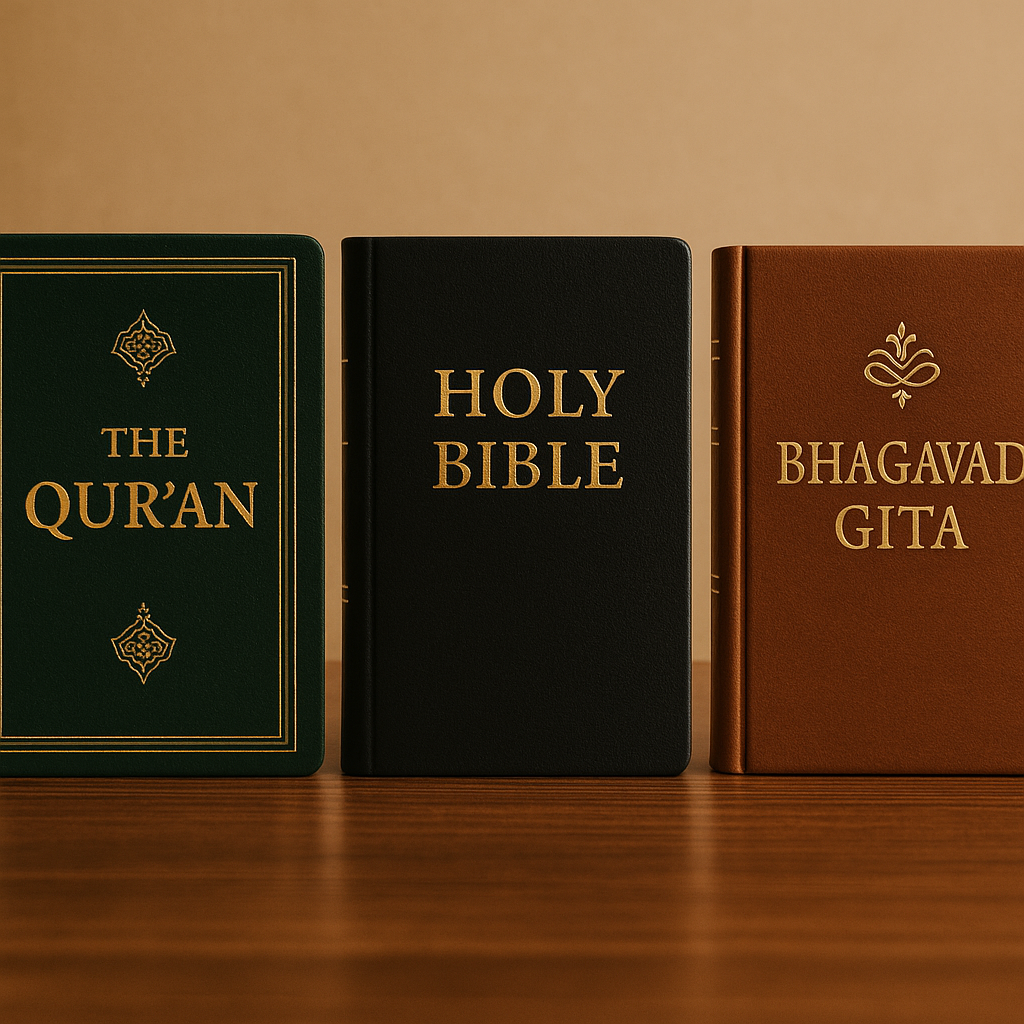🕊️ Divine Guidance or War Manual?

A Layman’s Reflection on the Messages of the Quran, Bible, and Bhagavad Gita
If God is truly eternal, merciful, and all-knowing, wouldn’t His message to humanity also be timeless, peaceful, and universal?
This question often arises when reading sacred texts. Many people today are disturbed when they come across verses in religious books that sound violent or intolerant.
Some say, “This verse only applied to that war, in that place, at that time.” But then you must ask: Can a truly divine revelation be bound by time, war, or politics?
This article explores the difference between divine messages meant to uplift all of humanity versus battlefield instructions tied to specific times and tribes.
⚔️ 1. War: Righteous Struggle or Human Conquest?
🕋 Quran
“Kill the polytheists wherever you find them…” — Surah 9:5
Revealed during tribal wars in early Islam. Though context-bound, this verse still sparks concern due to its violent tone and unclear boundaries for application today.
✝️ Bible
“Do not leave alive anything that breathes... completely destroy them.” — Deuteronomy 20:16–17
This was a command for total destruction during Israelite conquests. Not spiritual advice for all time—but still remains in the scripture.
🕉️ Bhagavad Gita
स्वधर्ममपि चावेक्ष्य न विकम्पितुमर्हसि। — Gita 2.31
“You should not waver from your duty; for a warrior, nothing is greater than a righteous battle.”
The Gita’s war is symbolic. Krishna urges Arjuna to fight inner weakness and injustice—not people of other faiths.
🙏 2. Disbelief: Diversity or Damnation?
🕋 Quran
“Those who disbelieve… are the worst of creatures.” — Surah 98:6
“Allah does not forgive association with Him (shirk)...” — Surah 4:48
Polytheism is seen as the gravest sin, deserving of eternal punishment. This creates fear and division among diverse faiths.
✝️ Bible
“No one comes to the Father except through me.” — John 14:6
“You shall have no other gods before me.” — Exodus 20:3
Christian doctrine emphasizes exclusive salvation through Jesus. This has historically led to religious intolerance.
🕉️ Bhagavad Gita
ये यथा मां प्रपद्यन्ते तांस्तथैव भजाम्यहम्। — Gita 4.11
“However people approach Me, I receive them. All paths lead to Me.”
The Gita embraces all sincere seekers—regardless of name, form, or tradition. It promotes unity, not fear.
⚖️ 3. Divine Justice: Damnation or Dharma?
🕋 & ✝️ Quran and Bible
Both scriptures contain verses warning of eternal hell for disbelievers. Justice often includes punishment for beliefs, not just actions.
🕉️ Bhagavad Gita
यदा यदा हि धर्मस्य ग्लानिर्भवति भारत। — Gita 4.7
“Whenever there is a decline in dharma and rise of adharma, I manifest Myself…”
Justice in the Gita is based on dharma (righteous action) and karma (consequences). No one is judged by belief—but by their ethical choices.
🌍 4. Timeless or Time-Bound?
A divine message should not expire after one war or one century. It should be relevant to all humans, always.
| Question | Quran & Bible | Bhagavad Gita |
|---|---|---|
| Does it promote war? | Yes, in historical context | No, symbolic inner battle |
| Does it condemn other beliefs? | Yes | No |
| Is punishment external (hell)? | Yes | No – karma-based |
| Are other faiths accepted? | Only through conversion | Yes, if sincere |
| Is it timeless? | Needs historical explanation | Yes, stands universally |
🕯️ Conclusion: Let’s Choose the Path of Peace
The Creator of the universe would not ask one child to punish another for believing differently.
A truly divine message should transcend culture, time, and war. It should speak to the heart of every human being, and teach compassion, not compulsion.
Among these scriptures, the Bhagavad Gita stands out—not because it’s Hindu, but because its message is universal, non-threatening, and timeless.
“One may call Him Allah, God, Krishna, or simply the Universe—if your heart is sincere, He listens.”
Let’s walk our path of faith peacefully, and allow others the same freedom.
- quran
- holybible
- bhagavadgita
- interfaithdialogue
- religiouscomparison
- spiritualwisdom
- timelesstruth
- dharma
- adharma
- shirk
- disbelievers
- godisone
- peacefulcoexistence
- freedomofbelief
- divinewisdom
- coexistence
- unityindiversity
- comparativefaith
- religionsidebyside
- universaltruth
- religiousharmony
- sacredtexts
- allfaithsonepath
- Political Leaders
- Art & Crafts
- Dance & Music
- Sanatan Dharma
- Education & Training
- Food & Drinks
- Gaming
- Health & Fitness
- Home & Gardening
- Literature & Culture
- Love
- Medicine & Ayurveda
- Motors & Vehicles
- Movies & Cinema
- Parenting
- Politics
- Science & Technology
- Shopping
- Social Media
- Spirituality
- Sports
- War & History
- Yoga & Meditation
- Travel & Tourism
- Natural Disaster
- Business & Startups
- DIY & Home Decor
- Finance
- Personal
- News
- Pet Lovers
- Wild Life & Nature
- Podcast & Audio Books
- Poetry
- Law & Order
- Moral Stories
- Jokes & Humour
- Other


